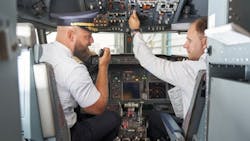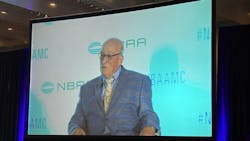John Goglia Spotlights Aviation Safety in HBO’s The Rehearsal
The second season of HBO’s The Rehearsal is bringing aviation safety into mainstream conversation, with John Goglia appearing as an industry expert in the series.
John Goglia is the president of the Professional Aviation Maintenance Association (PAMA) and a former member of the National Transportation Safety Board (NTSB). With decades of experience and knowledge in the aviation industry, Goglia is a go-to resource on aviation safety.
When Nathan Fielder, comedian and host of The Rehearsal, stumbles upon an apparent trend—miscommunication in the cockpit potentially being a direct cause of airline crashes—he shows hesitation about his credibility, noting, “Aviation safety is serious stuff. Was I really the man to do this?”
Enter Goglia, who meets with Fielder throughout the season, reviewing his research and offering expert insight on aviation safety issues, documented trends in aircraft collisions and current legislation and training protocol related to pilot communication.
Speaking with Aviation Pros about his time on the show, Goglia asserts, “I believe he genuinely cares about aviation safety, has studied accident reports in detail and believes—as the NTSB did—that role-playing could help make co-pilots more assertive when they need to be and captains more willing to listen to their co-pilots.”
How The Rehearsal Can Inform Pilot Training
The crux of The Rehearsal’s second season is Fielder’s exploration of communication between pilots and its impact on safety during flight.
Goglia shares, “I wanted to support the thesis that cockpit communications are critical and that improvements, even small ones, can make a difference in aviation safety.”
Fielder’s proposed solution for enhancing pilot communication in the cockpit involves a role-playing activity.
In the series, he explains, “When the pilots arrive for their flight, along with their pre-flight bulletins, they’re each digitally sent a one-page document with a character description and two short lines of dialogue to memorize. The pilots will be assigned one of two characters. The first officer is assigned the role of First Officer Blunt…a pilot who loves speaking up. He’s honest, almost to a fault, and not afraid to take over the controls if necessary. And most importantly, he’s a great pilot.”
Fielder continues, “The captain of the flight is assigned the role of Captain Allears…[who] loves feedback and is not afraid to admit when he’s wrong. The pilots will use their time in the pilot’s lounge to engage in a short, scripted introduction that serves to both get them into character and confirm to each other that they’ve each read their character brief.”
“And those lines are it. They can just go back to flying as themselves, but now, they have the excuse of these characters to take actions that would normally be socially challenging for them…And through our experimentation, we found that pilots end up actually bonding over how silly it all is,” he concludes.
Fielder asserts, “It was like the concept of acting itself disarmed everyone in its presence, and the actor gets a free pass for virtually any behavior.”
While Fielder’s proposed method has received mixed reactions from the public, Goglia clarifies that it’s not as unconventional as it may seem.
Goglia says, “Role-playing was a formal NTSB recommendation to the FAA based on years of studying the authority gradient and its contribution to aircraft crashed. I think the people who say this [that Fielder’s method is not credible] may be uninformed as to the NTSB's research and the background to its recommendation.”
He continues, “In addition, role playing is a common tool for training people in difficult situations. For example, I've seen it used in media training and many other contexts. I support role-playing as a tool in CRM training.”
Goglia also shares his plans for using The Rehearsal as a teaching tool, explaining, “I am planning to incorporate this series in my Aviation Safety course at Vaughn College of Aeronautics. My students are mostly future pilots and future air traffic controllers, and raising awareness of communication issues at an early stage of their training is important. I'm interested in getting their feedback on the show and how it resonates with them.”
Highlighting Mental Health Stigmas Faced by Pilots
In conjunction with the communication issue, Fielder observes the challenges in mental wellness that pilots face, largely resulting from regulations that pose a risk of losing one’s piloting license at the mention of struggling with mental health.
Many of the challenges Fielder explores surround the idea that pilots may refrain from seeking care for mental health conditions out of fear and that first officers often lack the confidence to speak up when they believe their captain is making an incorrect choice in the cockpit. According to Fielder, this could be the root cause of several airline crashes.
Fielder shares, “Everything I’ve been trying to do just comes down to getting copilots and captains to just act on their true feelings, either speaking up about their feelings or admitting to your copilot that you might not know everything. These are feelings that every pilot already has but many struggle to act upon because they fear the consequences. Could the concept of acting give pilots a loophole to do the things they’re most afraid of?”
Fielder adds, “We all want pilots to be perfect, but maybe in some instances, we actually want them to know that they’re not.”
Goglia echoes this, speaking on the show’s messaging and impact on the public conversation surrounding aviation safety and pilot wellness.
Goglia shares, “It's definitely unconventional but has started a tremendous conversation on air safety issues—the impact of the authority gradient between captains and copilots, especially at critical moments, and the issue of pilot mental health and the reluctance to get help because of the potential impact on their medical licenses and hence their employment.”
He adds, “If nothing else, the show has started a great conversation on these issues among pilots and people who train pilots. Greater awareness is definitely a positive thing. And it's always possible that Congress and the FAA will take another look at these issues and see what improvements can be made.”
Less than a month after the finale of The Rehearsal season two aired, the House Transportation and Infrastructure Committle passed the Mental Health in Aviation Act of 2025.
The AOPA shares a few of the key provisions in the legislation, such as, “requiring the FAA to revise regulations to encourage voluntary mental health disclosures and treatment” and “calling for annual reviews of the special issuance process to expand treatment options and medications.”


